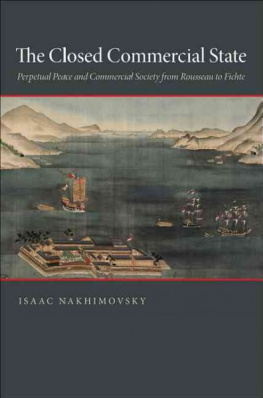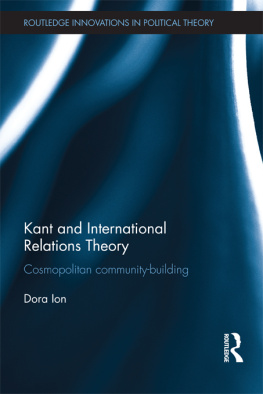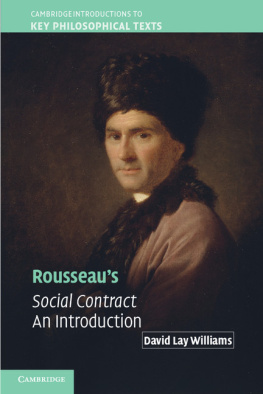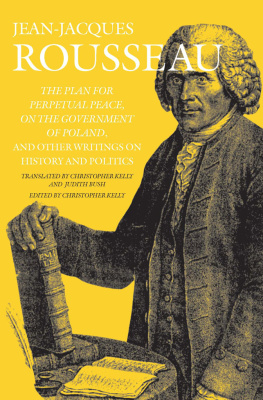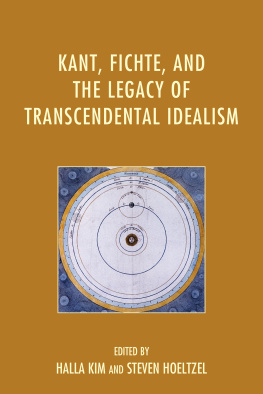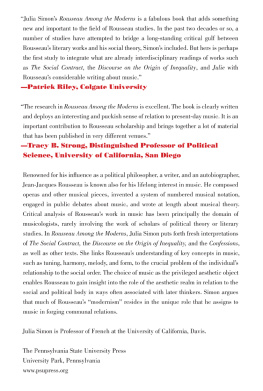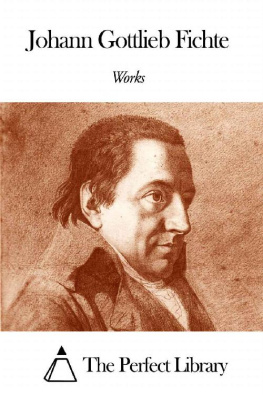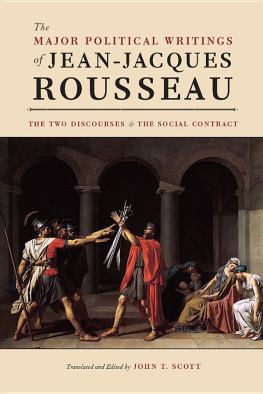The Closed Commercial State
The Closed Commercial State
Perpetual Peace and Commercial Society from Rousseau to Fichte
ISAAC NAKHIMOVSKY
PRINCETON UNIVERSITY PRESS
Princeton and Oxford
Copyright 2011 by Princeton University Press
Published by Princeton University Press, 41 William Street, Princeton, New Jersey 08540
In the United Kingdom: Princeton University Press, 6 Oxford Street, Woodstock, Oxfordshire
OX20 1TW
press.princeton.edu
All Rights Reserved
Library of Congress Cataloging-in-Publication Data
Nakhimovsky, Isaac, 1979-
The closed commercial state : perpetual peace and commercial society from Rousseau to Fichte / Isaac Nakhimovsky.
p. cm.
Includes bibliographical references and index.
ISBN 978-0-691-14894-6 (hardback : alk. paper) 1. Fichte, Johann Gottlieb, 17621814. Geschlossene Handelsstaat. 2. Rousseau, Jean-Jacques, 17121778Political and social views. 3. Kant, Immanuel, 17241804Political and social views. 4. State, TheHistory18th century. 5. Commercial policyHistory18th century. 6. Social contractHistory18th century. 7. RepublicanismHistory18th century. I. Title.
JC181.F615 2011
320.101dc22 2010046860
British Library Cataloging-in-Publication Data is available
This book has been composed in Minion Pro
Printed on acid-free paper.
Printed in the United States of America
10 9 8 7 6 5 4 3 2 1
To my parents
Contents
Acknowledgments
The terms used in the title of this book belong to a language of political reflection that is at once familiar and remote. They evoke concerns that we consider our owncapitalism, the welfare state, democracy, globalizationin the foreign voice of a past age imagining its future. For introducing me to this language, teaching me to appreciate it, and encouraging me to persevere in studying it, I am deeply grateful to Istvan Hont, Michael Sonenscher, and Richard Tuck.
This book began as a dissertation in the Department of Government at Harvard University, where I was lucky to have the guidance and support of many other teachers, colleagues, and friends, especially Noah Dauber, Ioannis Evrigenis, Stanley Hoffmann, Daniel Hopkins, Yevgeniy Kirpichevsky, Joseph Kochanek, Phillip Lipscy, Karuna Mantena, Colin Moore, Glyn Morgan, Russell Muirhead, Eric Nelson, Aziz Rana, Nancy Rosenblum, Verity Smith, Mark Somos, and Annie Stilz. It was completed during what was meant to be only a yearlong stay in England but very fortunately became a Junior Research Fellowship at Emmanuel College, University of Cambridge. During this time, I learned a great deal from collaborations, discussions, and exchanges with Duncan Bell, Richard Bourke, Christopher Brooke, Raymond Geuss, Shruti and Vijay Jayaraman, Bla Kapossy, Duncan Kelly, Avi Lifschitz, Reidar Maliks, Almut Moeller, Douglas Moggach, Sarah Mortimer, the late Emile Perreau-Saussine, Sophus Reinert, Alexander Schmidt, and Koen Stapelbroek, among many others.
Ian Malcolm has been an expert editor, and I am grateful to two anonymous readers for Princeton University Press for their incisive comments. I am also grateful for all the valuable feedback I received on presentations I made at the following workshops, seminars, and conferences: the Harvard Political Theory Workshop; the Center for Early Modern Studies at Erasmus University, Rotterdam; the Harvard Graduate Seminar on Ethics; the Seminar in the History of Ideas at the University of Lausanne; the New England Political Science Association annual meeting; the workshop Trade and War: The Neutrality of Commerce in the Interstate System at the Helsinki Collegium for Advanced Studies; the Cambridge Seminar in the History of Political Thought; the conference appeared in Collegium: Studies across Disciplines in the Humanities and Social Sciences 10 (2011), an issue titled Trade and War: The Neutrality of Commerce in the Interstate System, edited by Koen Stapelbroek.
My family and friends deserve more thanks than I can convey here. My parents and my sister have given me more than I could ever say. And finally, though she disapproves of this particular literary convention, I do in fact owe the ultimate in everything to my partner in everything, Chitra Ramalingam.
The Closed Commercial State
Introduction
The idea of a peaceful community of nations, sustained by democratic institutions and joined by trade, occupies a prominent place in our political imagination. This vision is generally traced back to a celebrated essay on perpetual peace, Zum ewigen Frieden, written in 1795 by the philosopher Immanuel Kant (17241804).pivotal development of Kants model of perpetual peace. This book shows how Fichte redefined the political economy of the Kantian ideal and extended it into a strategic analysis of the prospects for pacifying modern Europe.
Fichte was a theorist of the social contract who radicalized that tradition by demanding that the state secure the citizens right to work. This demand was part of an argument about the economic conditions for effective political citizenship, largely conducted in terms set by the Genevan philosopher Jean-Jacques Rousseau (171278). The Closed Commercial State was part of Fichtes attempt to reformulate Rousseaus theory of popular sovereignty and constitutional government in order to accommodate the changing nature of economic activity in a commercial society, or an increasingly postagrarian society marked by an extensive and expanding division of labor. Fichtes demand was also a response to a problem that had preoccupied both Rousseau and Kant: how to neutralize an unstable system of international relations whose escalating violence threatened to undermine the logic of the social contract and make it impossible to create and maintain a government of laws. The Closed Commercial State was Fichtes sequel to Rousseau and Kants writings on perpetual peace. Fichte claimed that Europe could not transform itself into a peaceful federation of constitutional republics unless economic life could be disentangled from the competitive dynamics of relations between states. He further claimed that this transformation could be achieved through a transition to a planned and largely self-sufficient national economy, made possible by a radical monetary policy.
The Closed Commercial State was a proposal for how to implement such a transition in a German state at the turn of the nineteenth century; its audacity inspired some and terrified most. But it also could be read in a rather different spirit, as it was by some important figures at the time: as a provocative, exaggerated, but nonetheless unusually philosophically rigorous restatement of Rousseau and Kants prognosis for the creation of a republican peace in modern Europe. This characteristic ambiguity, which pervades Fichtes response to Rousseau and Kant, also carries a wider significance. More than two centuries of debate have not resolved the problems that Fichte took up in his investigation of perpetual peace. Nor have they extinguished the persistently recurring Yet The Closed Commercial State remains a uniquely systematic and complete discussion of the political theory of national self-sufficiency, undertaken in the classic and familiar idiom of the social contract. Fichtes book has resurfaced, in various guises, with nearly every crisis of globalization since the Napoleonic wars. So long as eighteenth-century visions of perpetual peace retain a hold on our political imagination, it is worth taking a close look at Fichtes provocative contribution to the genre.
Beyond a growing but highly specialized circle of philosophers, the English-speaking world still encounters Fichte primarily as an apostle of German nationalismthe unfortunate result of late-nineteenth-century myth-making efforts and the fallout from two twentieth-century world wars.
Next page
